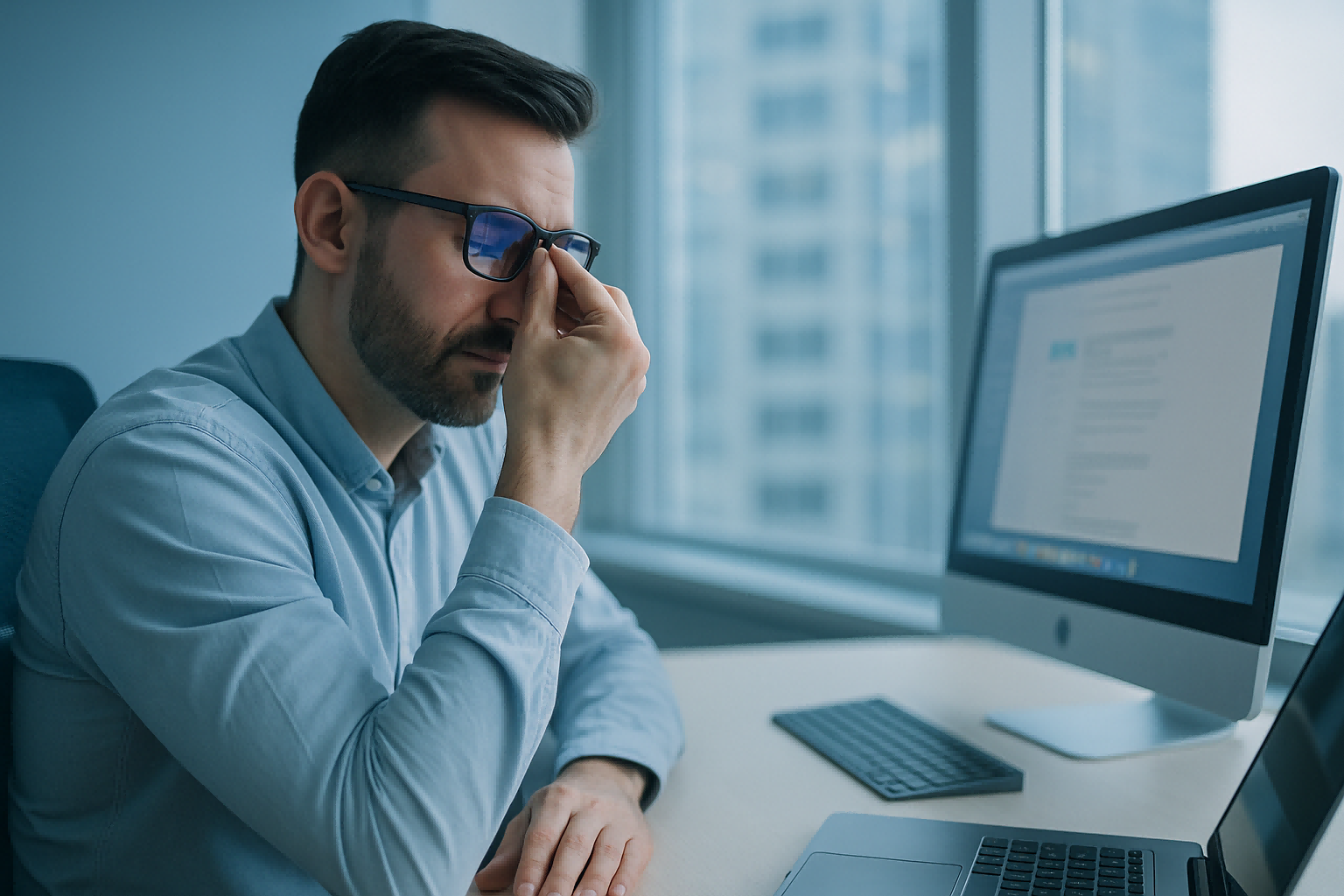Send My Projects Request
Computer Vision Syndrome: A Five-Step Relief Plan for Office Workers | Blue Light Glasses Vision Care Guide
Long hours in front of a computer screen have become the norm for modern office workers.
But what many people do not realize is that this daily routine contributes directly to Computer Vision Syndrome (CVS)—a cluster of eye and visual symptoms triggered by prolonged digital device use.
Dryness, tightness around the eyes, blurry vision, headaches, and neck stiffness are just a few of the signs. Without early intervention, CVS can gradually lead to tear film instability, ciliary muscle overuse, and slower neural responses, eventually affecting long-term visual performance.
This article introduces a five-step relief plan tailored for office workers, incorporating evidence-based methods such as blue light glasses vision care, safety reminders about eye massager side effects, and modern neuro-optical support technologies like microcurrent for eyes and vision revive systems.

1. What Is Computer Vision Syndrome (CVS)?
CVS arises from prolonged, uninterrupted screen exposure. Common causes include:
-
Excessive short-wave blue light
-
Reduced blinking → faster tear evaporation
-
Continuous near-focus → ciliary muscle fatigue
-
Poor lighting or screen glare
-
Elevated neural load from rapid image processing
Studies show that over 75% of people who use a computer for more than 4 hours daily experience at least one CVS symptom.
2. The Five-Step Relief Plan for Office Workers
Step 1: Reduce Blue Light Exposure—Smart Vision Care
Blue light glasses vision care can help by:
-
Filtering short-wave blue light
-
Reducing visual stress and photic stimulation
-
Supporting healthier sleep patterns after evening screen use
Blue light glasses do not replace eye care routines, but they significantly decrease visual load during prolonged screen time.
Step 2: Follow the 20-20-20 Rule (Non-Negotiable)
Every 20 minutes → Look at something 20 feet away → For at least 20 seconds.
Benefits include:
-
Relaxation of the ciliary muscle
-
Resetting visual neural pathways
-
Reducing accommodative strain
Pairing this with eye exercises for myopia or distance-focus training enhances results.
Step 3: Maintain Tear Film Stability—Proper Dry Eye Care
Long screen exposure reduces blinking, destabilizing the tear film.
Recommendations:
-
Maintain room humidity at 45–55%
-
Perform conscious blink training
-
Avoid direct airflow from air conditioners/heaters
-
Use preservative-free artificial tears if necessary
For chronic dryness, combine:
-
Dry eye relief routines
-
Gentle lid hygiene
-
Mild heat therapy (avoid excessive heat)
Step 4: Use Eye Massagers Safely—Understand the Side Effects
Eye massagers can:
-
Improve circulation
-
Relax periocular muscles
-
Reduce eye strain
However, eye massager side effects may occur if used incorrectly:
Possible Side Effects
-
Increased eye pressure from excessive force
-
Worsened dryness from overly strong heat modes
-
Pressure risks for people with glaucoma
-
Irritation from strong vibration patterns
Usage tips:
-
Choose low-pressure, gentle vibration modes
-
Avoid direct pressure on the eyeball
-
Glaucoma or high-pressure individuals should consult a doctor
-
Do not use devices that produce intense heat or suction
Step 5: Adopt Neuro-Optical Training with Modern Eye-Care Devices
Traditional relief methods treat surface symptoms, but neuro-optical technologies address deeper functional causes.
The Skaphor Vision Revival Device, built on the principles of:
-
Micropulse Photoreceptive Repair Technology
-
Microcurrent for Eyes
-
Neural pathway activation for optic nerve regeneration support
can:
-
Improve neural response time after long screen use
-
Reduce accommodative muscle tension
-
Enhance contrast sensitivity
-
Support tear film stability
-
Alleviate CVS-related blur, dryness, and fatigue
This makes it a valuable long-term support tool for office workers.
3. Optimize Your Work Environment
-
Adjust screen brightness to match ambient lighting
-
Keep screen distance at 50–70 cm
-
Avoid reflections and glare
-
Use a readable text size
-
Maintain proper posture
4. When Should You Seek Medical Attention?
If you experience:
-
Persistent headaches or eye pain
-
Long-lasting blurry vision
-
Nighttime vision deterioration
-
A sensation of increased eye pressure
-
Severe or chronic dry eye symptoms
consult an eye doctor for further evaluation.
Computer Vision Syndrome has quietly become one of the most common health issues among office workers.
But with the right habits—blue light glasses vision care, structured breaks, tear-film management, safe use of eye massagers, and long-term neuro-optical support—you can dramatically reduce screen-related eye stress.
Your eyes are working for you all day.
Give them the science-based care they deserve.
Recommended for you




FAQ
About Company
What is the background of the R&D team?
The core team consists of experts from Zhongshan Ophthalmic Center and PhDs in optoelectronic engineering, and owns 15 patents related to visual rehabilitation.
About Skaphor
Where is Skaphor based and where do you ship?
We are based in Guangzhou, China, and our products are exported to over 30 countries worldwide, including the U.S., UK, Australia, South Korea, and many more.
Do you offer OEM or ODM services?
Absolutely. We have a complete and mature OEM/ODM system and welcome global partners to customize products with your branding and requirements.
About Products
What is the difference between Skaphor and other eye care devices?
Ordinary eye care device only massages the eye area, while Skaphor directly stimulates the visual cortex through 0-100Hz bio-optical signals (clinical effectiveness rate of 92%).
Marketing Support
Do you provide sales kits?
Provide kits containing qualification documents, clinical data, product promotional materials, clinical cases, etc.
-
Contact Us for More Details
-
-
For custom designs, competitive pricing, or strategic partnerships, reach out to us. We'll get back to you promptly—usually within 24 hours.
-
© 2026 Skaphor. All Rights Reserved.

zhu Juliy
Skaphor_ Juliy